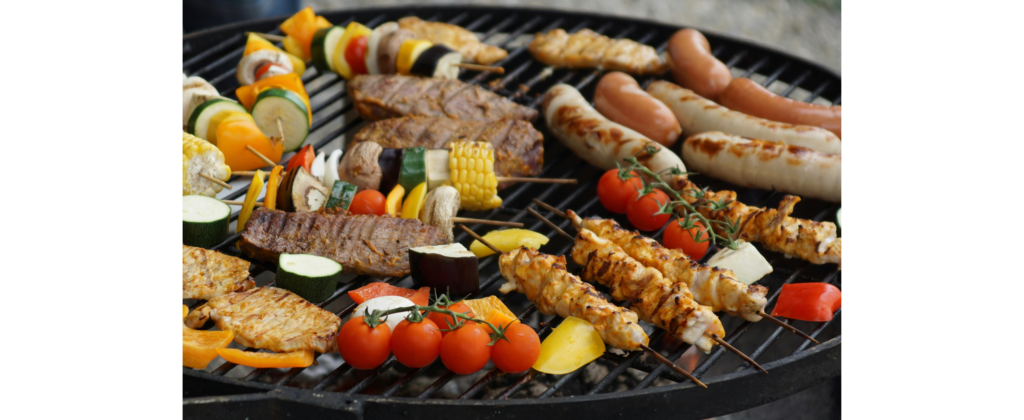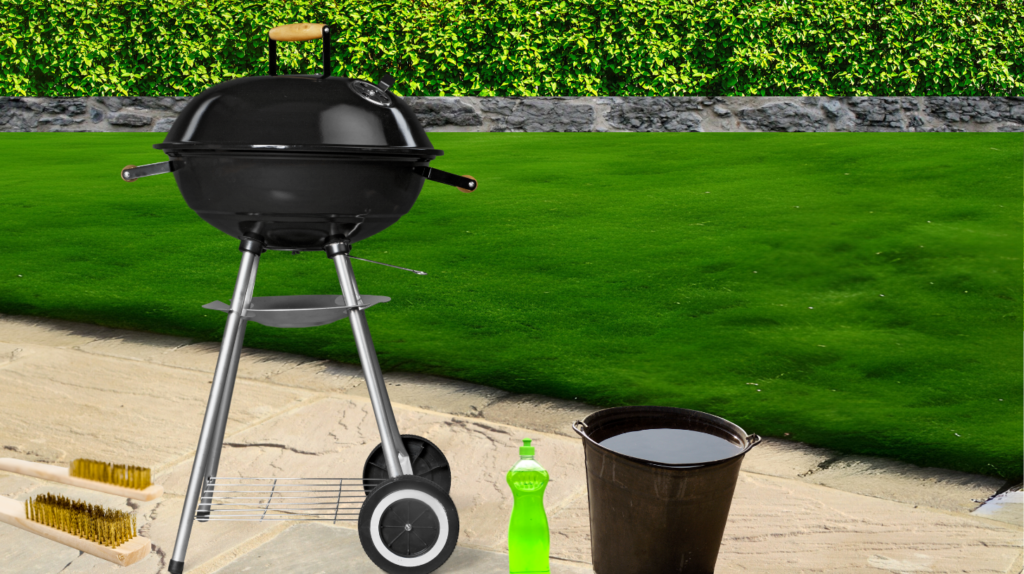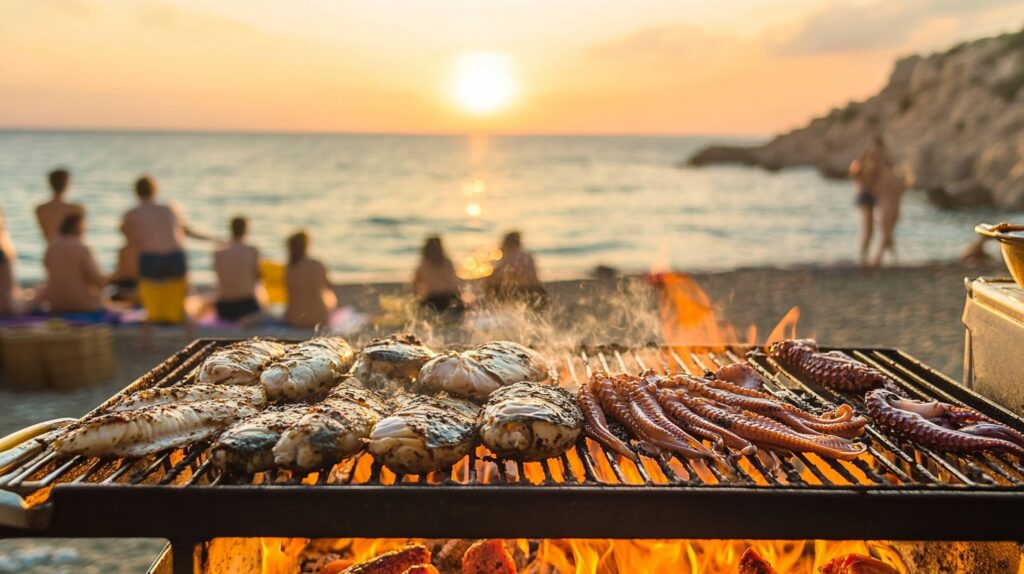Are you looking forward to cooking delicious meals for picnics and camping? There’s something about the aroma of food cooking outdoors that puts a smile on everyone’s face. Picking the best portable camping grill can make this happen. But with so many choices, how do you find the best one? This guide will help you choose from the top portable grills for camping, making your outdoor meals both mouth-watering and memorable.
Choosing the right portable camping grill can make cooking outdoors way more enjoyable. This guide will make it easier for you to decide by highlighting the key things to think about.
Understanding Your Needs
When it comes to choosing the best portable grill for camping, understanding your specific needs is key. Here’s a few important factors to consider.
Frequency of Use
Evaluate how often you will be camping and require a grill
Think about how often you plan to go camping. Are you someone who camps pretty much every weekend, or do you only head out a few times a year? If you’re a frequent camper, you’ll want a grill that can handle tough use and is easy to maintain.
Consider investing in a more durable model for frequent use
If you find yourself camping often, it’s wise to invest in a more durable grill. A sturdy model will withstand regular use and the wear and tear of travel, so it won’t let you down and leave you starving far away from the nearest takeaway.
Group Size
Determine how many people you will be cooking for on average
Next, consider the size of your camping group. Are you usually cooking for just yourself, or do you often have family and friends come along? Knowing the average number of people you need to feed will help guide your choice.
Opt for a larger grill if catering to families or groups
If you’re cooking for a larger group or family, a bigger grill may be the way to go. This will allow you to cook more food at once, making meal prep faster and more efficient. Consider how you are going to transport it though. If you take along a trailer or a truck, you can choose a larger model (but remember you need to load and unload).
Food Preferences
Identify the types of food you plan to grill, such as meats, vegetables, or seafood
Think about the kinds of food you want to grill. Do you love sizzling steaks, grilled veggies, or fresh seafood? Your food preferences will influence the type of grill you’ll need.
Choose a grill that accommodates your preferred cooking style and food types
Select a grill that suits your cooking style and the food you enjoy. Whether it’s a grill with a higher heat capacity for searing meats or one with multiple burners for versatile cooking, make sure it aligns with what you cook.

Types of Portable Grills
When it comes to portable grills for camping, there are several types to choose from, each with its own set of benefits and drawbacks. Here’s some options to help you find the perfect grill for you.
Charcoal Grills
Pros:
Charcoal grills are a favorite for many campers because they offer that classic smoky flavor that brings a special touch to your food. Plus, they are generally more affordable than other types, making them a great choice for those on a budget.
Cons:
On the downside, charcoal grills require more time for setup and cleanup. You’ll need to bring along charcoal, which can add to your packing list. Additionally, getting the coals just right can take a bit of practice and patience.
Gas Grills
Pros:
Gas grills are known for their quick ignition and easy temperature control, so they’re a convenient option for those who want to start cooking right away. They’re perfect if you want a quick and easy way to grill.
Cons:
However, gas grills require propane, which means you’ll need to carry a propane tank. This can make them bulkier and slightly less portable compared to other options.
Electric Grills
Pros:
Electric grills are incredibly simple to use, and you don’t need to worry about storing fuel like charcoal or propane. Just plug them in, and you’re ready to cook.
Cons:
The main problem is that they need an electrical source, which might not be available at all camping sites. Additionally, you won’t get the traditional grilling taste that other grills provide.
Portable Pellet Grills
Pros:
Portable pellet grills combine the delicious flavor of charcoal grilling with the convenience of gas. These grills are versatile and can handle a variety of cooking styles, from smoking to roasting.
Cons:
On the flip side, portable pellet grills tend to be more expensive. They also require pellets, which means you’ll need to plan ahead to ensure you have enough for your trip.
Each type of grill has its unique strengths, so consider what matters most to you while camping. Whether it’s flavor, convenience, or cost, there’s a portable grill out there that will suit you.
Key Features to Consider
When you’re looking for the best small portable grills for camping, there are several key features you’ll want to keep in mind.
Size and Weight
One of the first things to consider is the size and weight of the grill. A lightweight and compact design is crucial for easy transport. You wouldn’t want to carry a bulky grill up a mountain or through a forest—definitely not ideal!
You’ll need to find a good balance between portability and cooking capacity. If you have a group coming along, and your grill won’t be big enough, see if someone else has one they can bring along. Or consider adding a little portable double burner gas stove for added capacity without taking up too much space in transport.
Cooking Surface Area
Next up is the cooking surface area. Check that the grill has adequate space for your meals. If you’re planning on grilling up a variety of foods, having a larger surface area can be a huge advantage. It allows you to cook multiple items at the same time, which means more time enjoying the great outdoors and less time waiting for food to cook.
Heat Source and Control
The heat source and control are also important aspects to consider. Having easily adjustable temperature controls is important for precise cooking. You don’t want to end up with overcooked or undercooked meals just because you couldn’t manage the heat properly.
Also, think about the type of fuel the grill uses. Is it propane, charcoal, or something else? Make sure the fuel is readily available and easy to use, especially if you’re camping in a remote area.
Durability and Material
Finally, there’s durability and material. Choose grills made from robust materials like stainless steel to ensure longevity. The old saying “you get what you pay for” is just as true for grills as anything else. I once bought a no name kettle BBQ, thinking it would do much the same job as a Weber. After a few uses the legs were loose, it was scratched and burnt and it was a nightmare to clean. I ended up removing the legs and using it as a planter.
Don’t forget about weather resistance and ease of cleaning, either. Check that your grill can handle a bit of rain and won’t take you hours to clean.
Popular Portable Grills
When choosing a portable grill, it’s important to consider factors such as size, budget, intended use, and portability. Here are some popular options that will give you a good idea of what’s available.
Small and Lightweight Grills
1. Weber Go-Anywhere Charcoal Grill
- Type: Charcoal
- Size: Small
- Budget: Affordable
- Use: Great for single or dual use
- Features: Compact and lightweight with a durable lid lock for easy transport. It has a classic charcoal flavor with a 160 square inch cooking space.
2. Cuisinart Petit Gourmet Portable Gas Grill
- Type: Gas
- Size: Small
- Budget: Moderate
- Use: Ideal for small family outings or picnics
- Features: Features a briefcase-style carrying handle, foldable legs, and a 145 square inch grilling surface. Quick and easy setup with propane.
Medium-Sized Grills
1. Coleman RoadTrip 285 Portable Stand-Up Propane Grill
- Type: Gas
- Size: Medium
- Budget: Moderate
- Use: Suitable for family use or tailgating
- Features: 285 square inches of cooking surface, three adjustable burners, and foldable legs with wheels. Offers convenient setup and transport.
2. Kamado Joe Jr.
- Type: Charcoal
- Size: Medium
- Budget: Premium
- Use: Perfect for charcoal enthusiasts and small families
- Features: Offers versatility in cooking styles, excellent heat retention, and a 148 square inch cooking surface. Includes a built-in thermometer and heat deflector.
Large and Premium Grills
1. Traeger Ranger Portable Wood Pellet Grill
- Type: Pellet
- Size: Large
- Budget: Premium
- Use: Ideal for those who love the convenience of wood pellet grilling
- Features: Offers 184 square inches of cooking space, digital control, and easy portability. Perfect for adding flavor with wood pellets.
2. Napoleon TravelQ 285 with Scissor Cart
- Type: Gas
- Size: Large
- Budget: Premium
- Use: Great for serious grillers and large families
- Features: Dual stainless steel burners, 285 square inches of cooking area, and an integrated scissor cart for mobility. Offers high-quality construction and performance.
Considerations
When selecting a portable grill, weigh the following factors:
- Fuel Type: Charcoal, gas, or wood pellets
- Cooking Space: Ensure it meets your needs
- Portability: Look for lightweight and easy-to-carry designs, unless you a large transportation capacity.
- Budget: Balance between features and price
Safety Tips
Camping is a fun and adventurous way to enjoy the great outdoors, and using portable BBQ grills for camping can make your meals so much better. You do need to keep safety in mind while cooking outside. Here are some safety tips to help you avoid any problems with your grill.
Safe Usage
Tips for Operating Grills Safely
When using portable BBQ grills for camping, you must operate them safely. First, make sure you set up your grill properly. This means following the manufacturer’s instructions and ensuring all parts are securely in place before lighting it up. Always keep an eye on the grill while it’s in use to prevent any accidents.
Importance of a Stable, Level Surface
Setting your grill on a stable, level surface is essential for safe cooking. An uneven surface can cause the grill to tip over, leading to burns or even a fire. Look for a flat spot away from dry leaves and twigs. Using a camping table or a designated grilling area can also provide a steady base for your grill.
Fire Hazards
Precautions to Prevent Accidental Fires
Preventing accidental fires is a top priority when using portable BBQ grills. Aways maintain a safe distance between the grill and any flammable materials, such as tents, chairs, or trees. It’s a good idea to create a clear space around your grill, free from dry grass or debris that could catch fire.
Importance of Having a Fire Extinguisher or Water Source Nearby
Having a fire extinguisher or a water source nearby is an absolute mustl when grilling outdoors. In case of an emergency, you need to be prepared to put out any flames quickly. A bucket of water, a fire extinguisher, or even a small fire blanket can be lifesavers in preventing a small flare-up from becoming a
Portable Grills Maintenance and Care
Taking care of your portable grill will make it last and you will be sure that it will work reliably. Here are some easy tips to help you keep your grill in top shape.
Cleaning Tips
Keeping your grill clean is not only about hygiene but also about keeping it performing well. Here’s how you can do it:

- Clean After Each Use: It might seem like a hassle, but cleaning your grill after each use makes it easier in the long run. Grease and food particles are much easier to remove when they are fresh.
- Use the Right Tools: A good grill brush is your best friend. Look for one with sturdy bristles to scrub off the bits of food stuck on the grates. For more stubborn spots, a scraper can be very handy.
- Soak Grates for Deep Cleaning: Occasionally, it’s a good idea to remove the grates and soak them in warm, soapy water. This helps lift off any grease buildup and makes them easier to scrub.
- Choose Suitable Cleaning Solutions: You don’t need anything fancy—mild dish soap and water will usually do the trick. For tougher grease, a special grill cleaner can be useful – just make sure it’s safe for your grill’s material.
Storage Advice
Proper storage is just as important as cleaning when it comes to maintenance.
- Keep It Covered: Once your grill is clean and dry, cover it with a grill cover. This protects it from dust and moisture, which can cause rust and damage over time.
- Store in a Dry, Sheltered Area: If possible, keep your grill in a garage or shed. The less exposure to the elements, the better. If that’s not an option, at least place it under an awning or another sheltered spot.
- Avoid Leaving It Out All Year: If you’re not using your grill in the off-season, it’s best to store it away completely. This not only prevents weather damage but also keeps it in better condition for your next camping trip.
Choosing the best portable camping grill doesn’t have to be a daunting task. Just keep a few key points in mind.
Key Points to Remember
- Size and Weight: Consider how much space you have and how you plan to transport the grill.
- Fuel Type: Decide between charcoal, propane, or electric depending on your cooking preferences and the availability at your campsite.
- Cooking Surface: Ensure the grill has a sufficient cooking area to prepare meals for your group.
- Durability and Material: Look for grills made from high-quality materials to withstand outdoor conditions. Stainless steel and cast iron are excellent choices.
- Ease of Use and Cleaning: Opt for a grill that’s easy to set up, use, and clean. Features like removable grates and ash pans can make maintenance a breeze.
Keep these in mind when you’re choosing your grill and you won’t go far wrong. Happy grilling!

